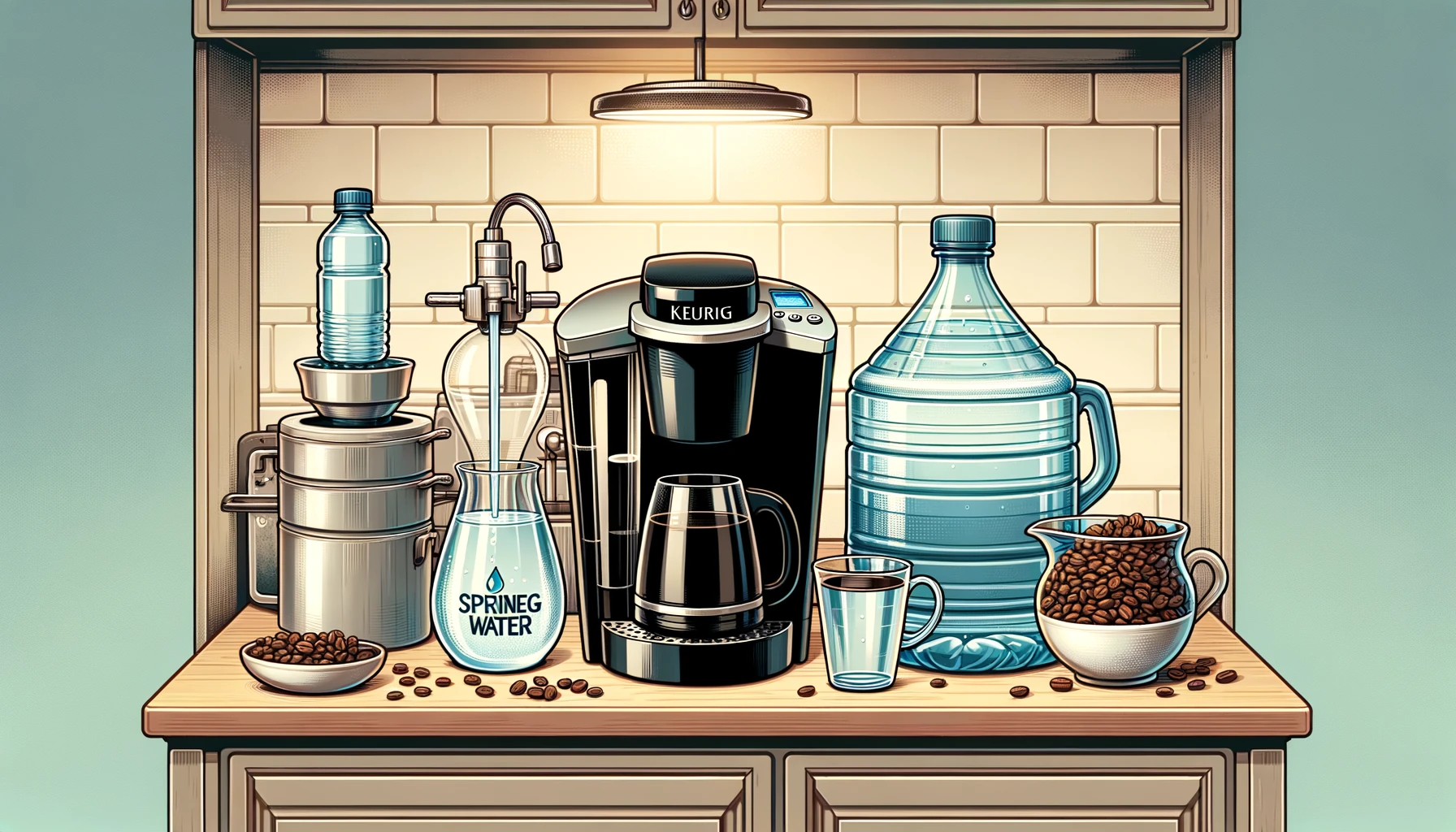Choosing the appropriate water for your Keurig can greatly enhance your coffee experience. You’ve likely noticed the difference a good cup makes in your day. But have you considered how crucial the water type is in achieving that perfect brew? Whether it’s the purity of filtered water or the balanced mineral content in spring water, each type offers unique benefits that impact both the taste and the longevity of your coffee maker. Let’s explore six of the best water types that could transform your daily coffee ritual. You might be surprised by the impact the right water can have on your favorite beverage.
Main Points
- Use filtered water to remove chlorine, odors, and impurities, enhancing coffee flavor.
- Opt for purified water to minimize scale buildup and maintain machine performance.
- Consider soft water (1-3 GPG hardness) to prevent mineral deposits and extend machine life.
- Charcoal-filtered water is ideal for removing contaminants and improving taste.
- Employ reverse osmosis water to eliminate heavy metals and other harmful substances.
DIY Filtered Water Refill Kit for Keurig Coffee Brewers by PureWater Filters
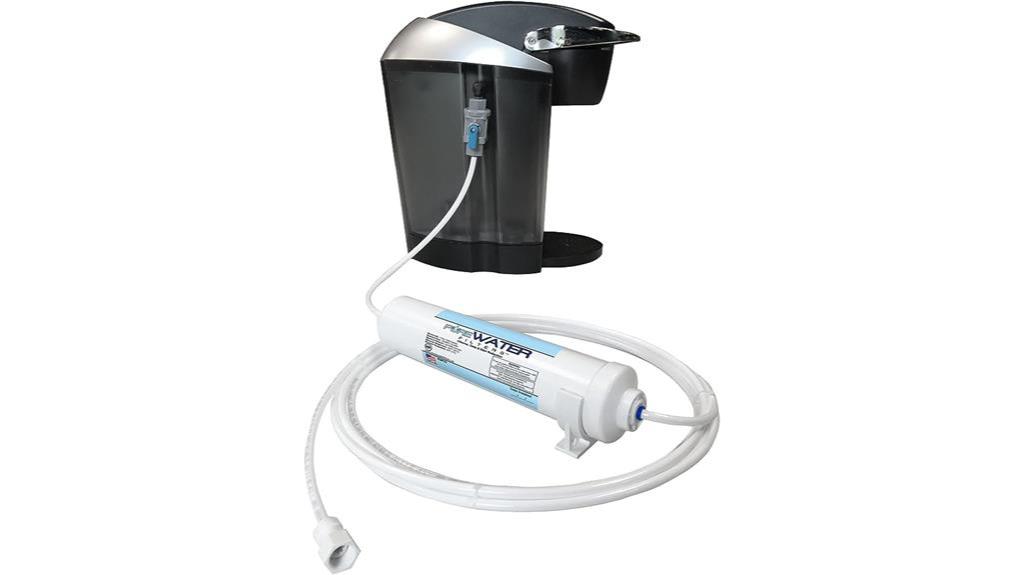
If you’re seeking a straightforward way to improve your coffee’s taste and protect your Keurig, the DIY Filtered Water Refill Kit by PureWater Filters is an ideal choice. This kit lets you quickly refill your reservoir with fresh, filtered water. It effectively removes chlorine, bad tastes, odors, lead, and heavy metals, ensuring every cup of coffee is as pure and delicious as possible.
The installation is a breeze, thanks to the included instructions, and it’s compatible with most non-commercial Keurig models. Plus, you’ll appreciate the peace of mind that comes with its lifetime warranty.
Don’t just take it from us; hundreds of users have rated it highly for its convenience and effectiveness.
Best For: Coffee enthusiasts and Keurig users looking for an easy way to enhance the taste and quality of their home-brewed coffee.
Pros:
- Provides quick refills of fresh, filtered water directly to the coffee brewer’s reservoir.
- Effectively removes impurities such as chlorine, odors, lead, and heavy metals.
- Includes a lifetime warranty, ensuring long-term reliability and customer satisfaction.
Cons:
- Installation may require some mechanical skills, which might be challenging for non-DIY inclined users.
- Only compatible with most non-commercial Keurig models, not all.
- Higher initial cost compared to not using a filtration system.
PureSec Coffee Maker AutoFill Kit for Non-Commercial Keurig Brewers
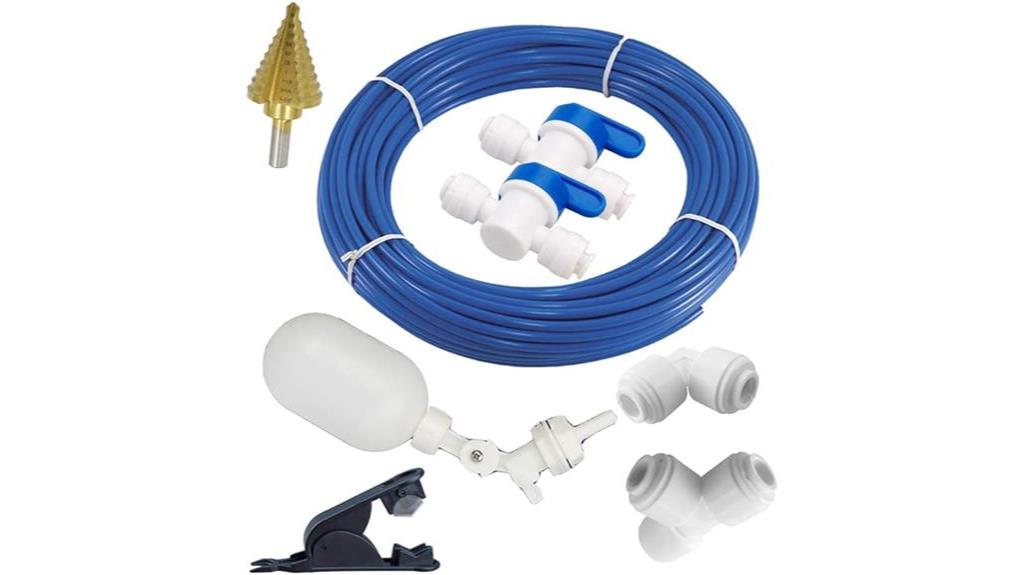
For Keurig owners tired of manually refilling the water reservoir, the PureSec Coffee Maker AutoFill Kit offers a convenient solution with its automated refill system. It’s crafted especially for various non-commercial Keurig brewers and guarantees that you always have filtered water ready for your next brew.
The kit includes everything you need: a 17-foot water line, float valve, elbow adapter, tee fitting, shutoff valves, a tube cutter, and even a drill bit for installation.
You’ll find the installation straightforward, requiring no professional help. Customers appreciate the ease of setting up and the immediate improvement in their coffee-making experience. Remember to install an inline filter and clean your tank regularly to keep your coffee tasting great.
This kit is perfect if you’re looking for hassle-free coffee prep every morning.
Best For: Keurig owners who want a convenient, automated solution to eliminate manual refilling of the water reservoir.
Pros:
- Easy installation with all necessary tools included.
- Automated refilling enhances convenience and saves time.
- Compatible with multiple non-commercial Keurig models.
Cons:
- Requires a sizable reservoir for proper installation.
- Installation instructions may be unclear or insufficient.
- Regular maintenance and additional inline filter needed for optimal performance.
Replacement Water Reservoir for Keurig K-Slim Single Serve Coffee Maker
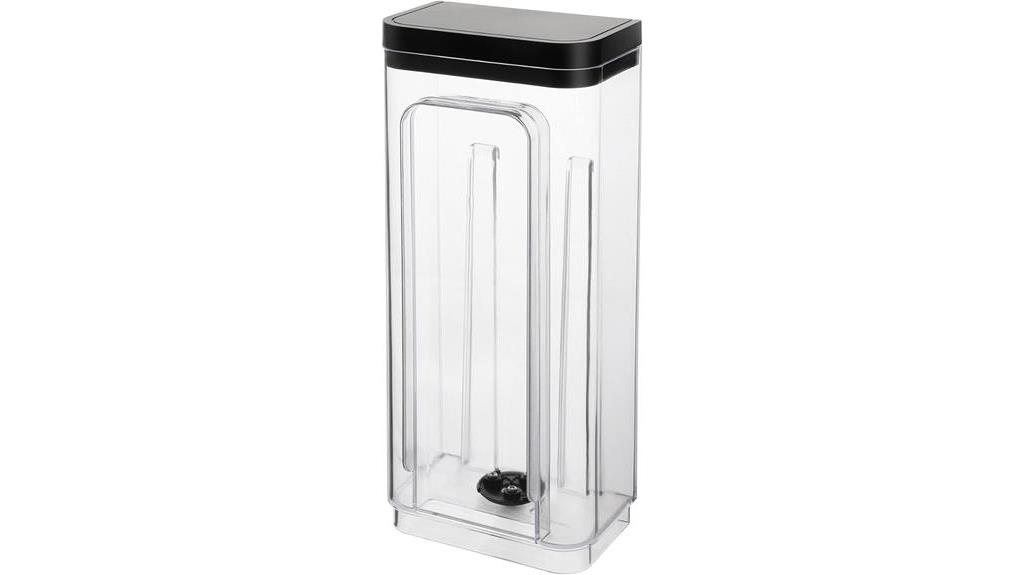
You’ll appreciate the large 46oz capacity of the Replacement Water Reservoir for your Keurig K-Slim if frequent refills during busy mornings aren’t your cup of tea. This reservoir’s size means you can brew several cups before needing a refill. It’s crafted exclusively for the Keurig K-Slim Single Serve Coffee Maker, guaranteeing a perfect fit and hassle-free installation.
Moreover, it’s made from high-quality, odor-free material that won’t impact the taste of your coffee. Cleaning is a breeze, as it disassembles easily for thorough maintenance. This ensures your coffee maker stays in peak condition, contributing to its long service life. Choose this reliable replacement from FIRJOY, crafted to keep your mornings smooth and your coffee delicious.
Best For: Those who need a large, easy-to-maintain water reservoir for their Keurig K-Slim coffee maker.
Pros:
- Large 46oz capacity reduces the frequency of refills.
- Made from high-quality, odor-free material to ensure pure coffee flavor.
- Easy to clean and disassemble for better maintenance.
Cons:
- Only compatible with the Keurig K-Slim model, limiting its use to specific machines.
- Clear material may show water stains or residues more visibly.
- Relatively high rank in Best Sellers suggests limited popularity or newer market entry.
GoldTone Premium Replacement Charcoal Water Filters for Keurig Machines (12-Pack)
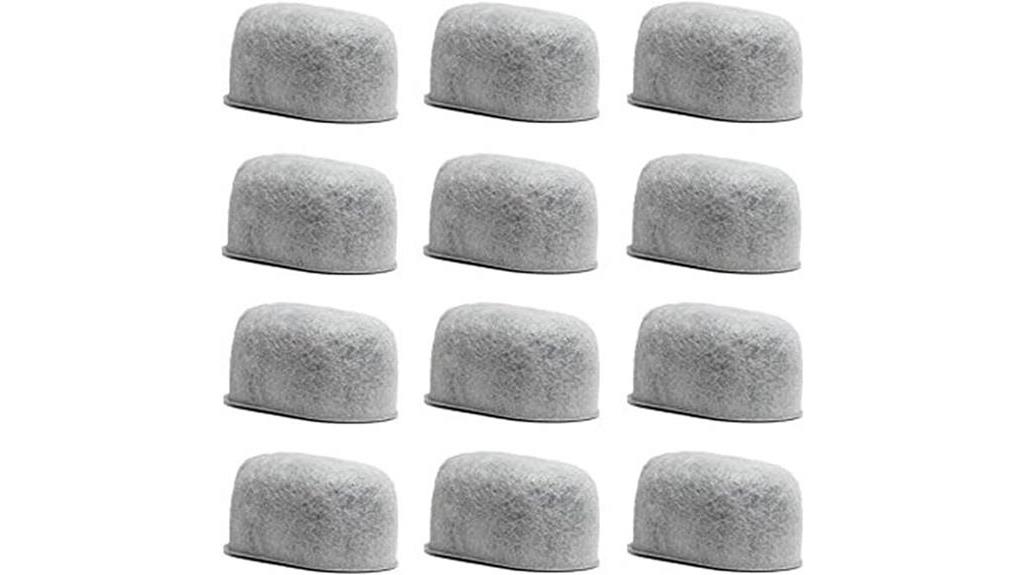
Keurig machine owners looking for improved flavor and purity in their brews will find the GoldTone Premium Replacement Charcoal Water Filters an ideal choice. These filters remove impurities such as chlorine, odors, and calcium, greatly enhancing the taste of your coffee. They match or surpass the quality of the original Keurig filters and fit all Keurig coffee machines, making them an excellent swap.
You’ll need to replace these filters monthly for best results, ensuring consistently fresh and delicious coffee. With a customer rating of 4.7 out of 5 stars, it’s clear that users appreciate the quality, fit, and value provided. Plus, they’re packed in bulk in an eco-friendly manner, offering both convenience and a nod to sustainability.
Best For: Coffee enthusiasts who own Keurig machines and desire a significant improvement in their brew’s taste and quality.
Pros:
- Effectively removes chlorine, odors, and calcium, enhancing coffee flavor.
- Compatible with all Keurig coffee machines.
- Offers a cost-effective alternative to brand name filters.
Cons:
- Requires monthly replacement to maintain optimal performance.
- Bulk packaging might not be preferred by all users.
- Limited information on the specific environmental impact of the packaging.
12-Pack Universal Fit Water Filters for Keurig Coffee Makers
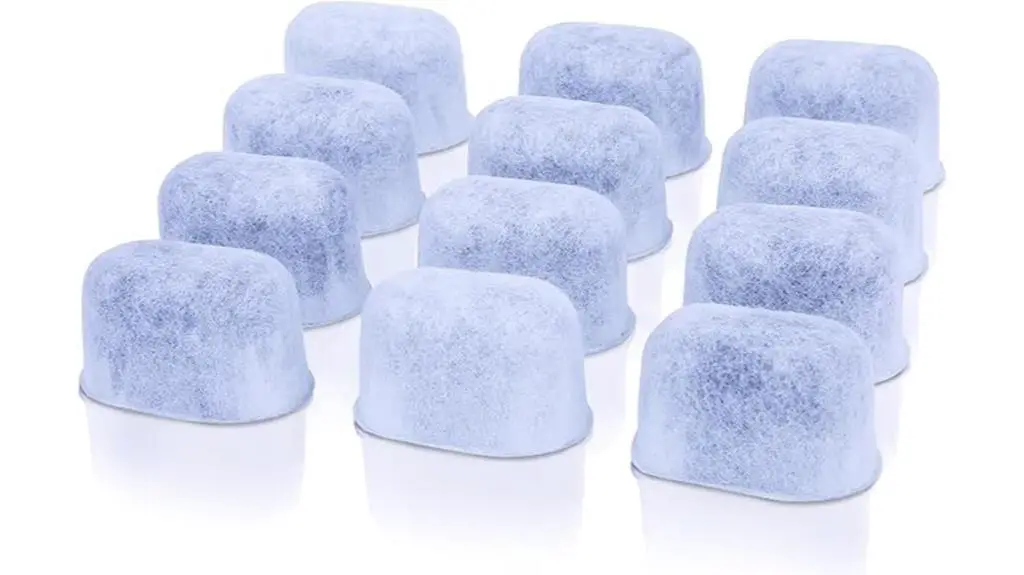
If you’re seeking high-quality, eco-friendly options for your coffee machine, the 12-Pack Universal Fit Water Filters for Keurig Coffee Makers are an ideal choice. These filters are compatible with all Keurig 2.0 and 1.0 models, ensuring you won’t have trouble fitting them into your machine. Made from premium materials, they’re designed to remove impurities effectively, enhancing the taste of your coffee.
You’ll also be making an environmentally conscious choice as these filters are crafted from recyclable materials. They’ve been highly praised for their quality and affordability, with many users noting the better taste in their coffee compared to other brands. Don’t forget to change them regularly for the best results, as suggested in the instructions provided.
Best For: Coffee enthusiasts looking for a high-quality, eco-friendly water filtration solution for their Keurig brewers.
Pros:
- Compatible with all Keurig 2.0 and 1.0 models, ensuring a universal fit.
- Made from recyclable materials, promoting environmental sustainability.
- Enhances the taste of coffee by effectively removing impurities.
Cons:
- Limited to use with Keurig coffee makers, not versatile for other coffee machine brands.
- Requires regular replacement to maintain coffee quality, which may be inconvenient.
- As a non-original brand, some users may prefer filters directly from Keurig despite the higher cost.
Replacement Water Reservoir for KEURIG K-COMPACT and K-LATTE Coffee Makers
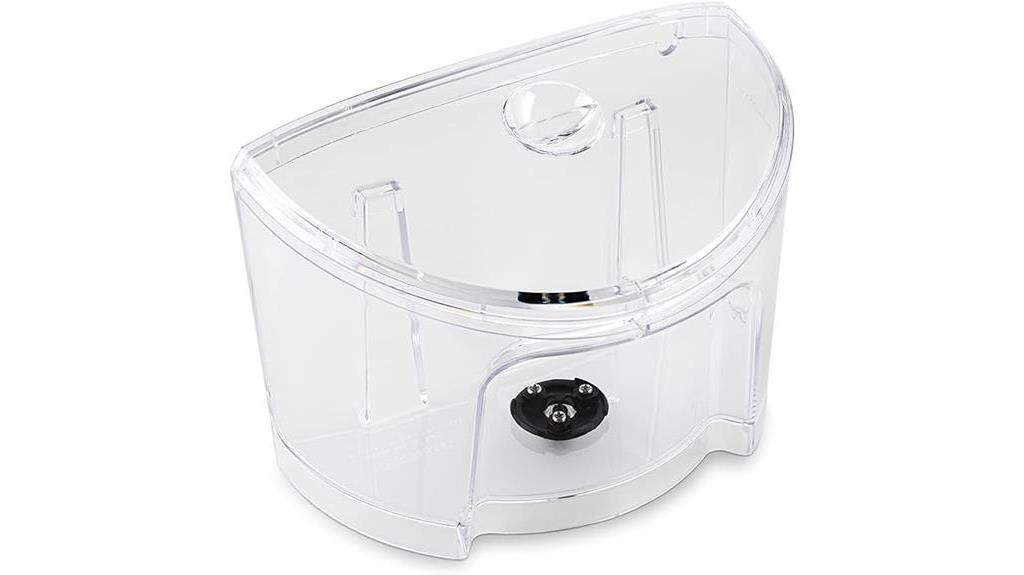
For those with a damaged or malfunctioning unit, the Replacement Water Reservoir is an ideal choice for KEURIG K-COMPACT and K-LATTE Coffee Makers. It’s designed exclusively for these models, ensuring a perfect fit and seamless operation, just like the original. If your current reservoir is cracked or broken, this replacement part will have you back to brewing in no time.
It includes the lid and matches the original in design and functionality, making it a reliable substitute. You’ll find it easy to wash and refill, keeping your coffee routine efficient and enjoyable.
Based on customer reviews, this reservoir is highly recommended due to its quality, fit, and quick delivery. Don’t let a faulty reservoir disrupt your coffee experience; grab this replacement and enjoy your brews just as you used to.
Best For: Those needing a direct replacement for damaged or faulty reservoirs in KEURIG K-COMPACT and K-LATTE Coffee Makers.
Pros:
- Perfect fit and identical functionality to the original reservoir
- Easy to clean and refill
- Positive customer feedback regarding quick delivery and efficient customer service
Cons:
- Only compatible with KEURIG K-COMPACT and K-LATTE models
- Limited availability in some regions
- Initial concerns that may require customer service intervention
Factors to Consider When Choosing Water for Your Keurig Coffee Maker
When selecting water for your Keurig coffee maker, you’ll want to take into account a few key factors to guarantee the best brew.
First, check the purity levels of your water, as high levels of impurities can affect taste and machine performance.
Also, understand the mineral content and hardness of your water since these can impact both the flavor of your coffee and the longevity of your Keurig.
Water Purity Levels
Understanding water purity levels is vital when selecting water for your Keurig coffee maker. The presence of contaminants like chlorine can greatly alter the taste of your coffee, making it taste more bitter or off. To avoid this, you should consider using water that’s been filtered or purified to remove these unwanted elements.
Remember, the purer your water, the better your coffee will taste. This isn’t just about flavor; it’s also about the longevity of your machine. Using water that’s free from harmful contaminants can help prolong the lifespan of your Keurig, as it prevents clogging and reduces wear and tear.
It’s also important to make sure the water you use isn’t too harshly treated with chemicals. While you want your water clean, overly processed water can strip away key qualities that might improve the flavor of your coffee. Opt for a balanced approach to water purification.
You don’t need to install a fancy filtration system immediately. Start with a simple water pitcher filter or an on-tap filter to see how it changes your coffee experience. By taking these steps, you’re not just improving your morning brew but also safeguarding your investment in your Keurig.
Mineral Content Impact
Aside from water purity, it’s also important to take into account the mineral content in your water as this impacts both the flavor of your coffee and the performance of your Keurig machine. If you’re finding your coffee tastes a bit off, or your Keurig isn’t performing as it should, the mineral balance in your water could be the culprit.
Hard water, rich in minerals like calcium and magnesium, might seem beneficial, but it can lead to scale buildup in your coffee maker, reducing its efficiency and lifespan. On the flip side, using soft water might avoid scale, but it often results in a flat, dull coffee flavor. Without enough minerals, the extraction process can falter, failing to pull out the full, vibrant flavors of the coffee.
The key is to find a happy medium. Water with an ideal balance of minerals, particularly magnesium and calcium, can greatly improve your coffee’s taste. Magnesium aids in extracting the aromatic compounds in coffee, while calcium contributes to the overall strength of the brew.
Understanding your water’s mineral content can guide you to make adjustments that improve both the taste of your coffee and the functionality of your Keurig. So, it’s worth taking a moment to check this aspect before your next brew.
Filtration Methods
To guarantee your Keurig brews the best coffee, explore the various filtration methods available, such as charcoal filters, reverse osmosis systems, or DIY kits. Each method has its unique benefits and suits different needs and budgets.
Charcoal filters are a popular choice; they’re great at removing chlorine and odors from your water, ensuring that nothing interferes with the taste of your coffee. They’re relatively inexpensive and easy to replace, making them a go-to for many Keurig owners.
If you’re looking for a more thorough cleaning, consider a reverse osmosis system. These systems excel at eliminating a wide range of contaminants, including heavy metals and microorganisms that can sneak into tap water. While they’re more of an investment upfront, their ability to purify your water is excellent.
For those who prefer a more hands-on approach, DIY filtration kits might be up your alley. They offer the convenience of refilling your Keurig’s reservoir with water that you’ve filtered yourself, combining cost-effectiveness with a personal touch.
When choosing your filtration method, think about what’s most important to you—whether it’s taste, budget, or the level of purity. Tailoring your choice to your specific preferences will improve your Keurig coffee experience significantly.
Taste Enhancement
Choosing the appropriate water for your Keurig can greatly enhance the flavor of your coffee. You’ll find that the quality of water you use is vital in determining how your coffee tastes. If the water contains impurities such as chlorine or certain minerals, it can greatly alter both the flavor and aroma of your brew.
To avoid this, consider using filtered or purified water. These options help remove unwanted flavors and odors, ensuring that nothing interferes with the pure taste of your coffee. However, be cautious about using distilled water. Although it’s free from impurities, it lacks the minerals that are important for extracting the full flavor from your coffee beans, often resulting in a flat-tasting cup.
Hardness Considerations
When selecting water for your Keurig, consider the hardness as it directly impacts the machine’s efficiency and the quality of your coffee. Hard water, rich in minerals like calcium and magnesium, can lead to a buildup inside your coffee maker, affecting both its performance and the lifespan of the machine.
Water hardness is typically measured in grains per gallon (GPG) or parts per million (PPM). For your Keurig, you’ll want to aim for a water hardness level between 1-3 GPG. This range helps prevent scale buildup, ensuring your machine operates smoothly. If your tap water falls outside this ideal range, it may start to clog the lines, slow down your brewing time, and could even damage your Keurig eventually.
To sidestep these issues, consider using filtered or bottled water. Many bottled waters have their mineral content listed, allowing you to choose one with suitable hardness. Filtered water, especially with a filter designed to reduce mineral content, can also be a great choice. This simple switch can maintain your Keurig’s best performance and keep those nasty mineral deposits at bay, letting you enjoy perfect coffee every time.
Maintenance Requirements
While considering the importance of your water hardness is vital, don’t overlook regular maintenance of your Keurig to guarantee peak performance and coffee quality. Regular cleaning of the water reservoir and descaling your coffee maker are essential. If you’re using hard water, it’s wise to contemplate a water softener to prevent clogs and ensure consistent brewing. This not only maintains the machine but also improves your coffee’s taste.
You should also use filtered or distilled water when possible. This reduces mineral buildup, which can extend the lifespan of your Keurig. Always check your user manual for specific maintenance recommendations and the frequency of cleaning. Each model might’ve slightly different needs, and staying on top of these requirements ensures that your machine functions smoothly.
Lastly, keep yourself updated on the manufacturer’s recommendations for maintenance. This is important as neglecting these guidelines could void your warranty. Regular upkeep not only prevents issues but also sustains the quality of your coffee. Remember, the care you put into your Keurig directly impacts the quality of your brew. So, make maintenance a regular part of your routine to enjoy the best your coffee maker can offer.
Cost Efficiency
To ensure cost efficiency, consider the various water sources available for your Keurig coffee maker. You’ve got options like bottled water, filtered tap water, or a dedicated water filtration system. Each has its costs and benefits, so it’s important to crunch the numbers.
Buying bottled water might seem convenient, but it can add up quickly over time. If you’re a daily coffee drinker, the expense can become significant.
Alternatively, using a water filtration system, either a simple jug filter or a more complex under-sink installation, might involve an upfront cost, but it typically pays off. Calculate the initial investment against the cost of buying bottled water. You’ll likely find that over months or years, the savings can be substantial.
Don’t forget to explore subscription services for water delivery or filter replacements. These can offer convenience while helping you manage costs effectively. Lastly, always factor in maintenance costs and filter replacements when evaluating the overall cost efficiency. These expenses are part of the deal, so consider them in your budget.
Frequently Asked Questions
Can Using Distilled Water Damage My Keurig Machine?
Using distilled water in your Keurig won’t damage it, but it can lead to less effective brewing over time because it lacks the minerals that help extract full flavor from your coffee.
How Often Should I Descale My Keurig Coffee Maker?
You should descale your Keurig coffee maker every 3 to 6 months to prevent mineral buildup and maintain its performance. Regular descaling guarantees your coffee tastes great and your machine runs smoothly.
Does Water Quality Affect Keurig Warranty Terms?
No, water quality doesn’t directly affect your Keurig’s warranty terms. However, using poor-quality water can lead to scaling and damage, which might not be covered under the warranty. Always check the terms.
Are There Eco-Friendly Water Options for Keurig Machines?
Yes, you can use eco-friendly water options for your Keurig. Consider filtered tap water or sustainable bottled water brands to reduce plastic waste while still enjoying delicious coffee from your machine.
Can I Use Tap Water With High Mineral Content in My Keurig?
You shouldn’t use tap water with high mineral content in your Keurig as it can lead to buildup and damage. Opt for filtered or bottled water to guarantee your machine functions properly.
Conclusion
To guarantee your Keurig coffee maker delivers the best taste and performance, opt for high-quality water options. Consider investing in a DIY filtered water kit, replacement reservoirs, or charcoal filters. Such accessories help maintain peak water hardness and purity, enhancing your coffee’s flavor while protecting your machine from mineral buildup.
Remember, the right water not only improves taste but also extends the lifespan of your coffee maker. Choose wisely and taste the difference in every cup.
